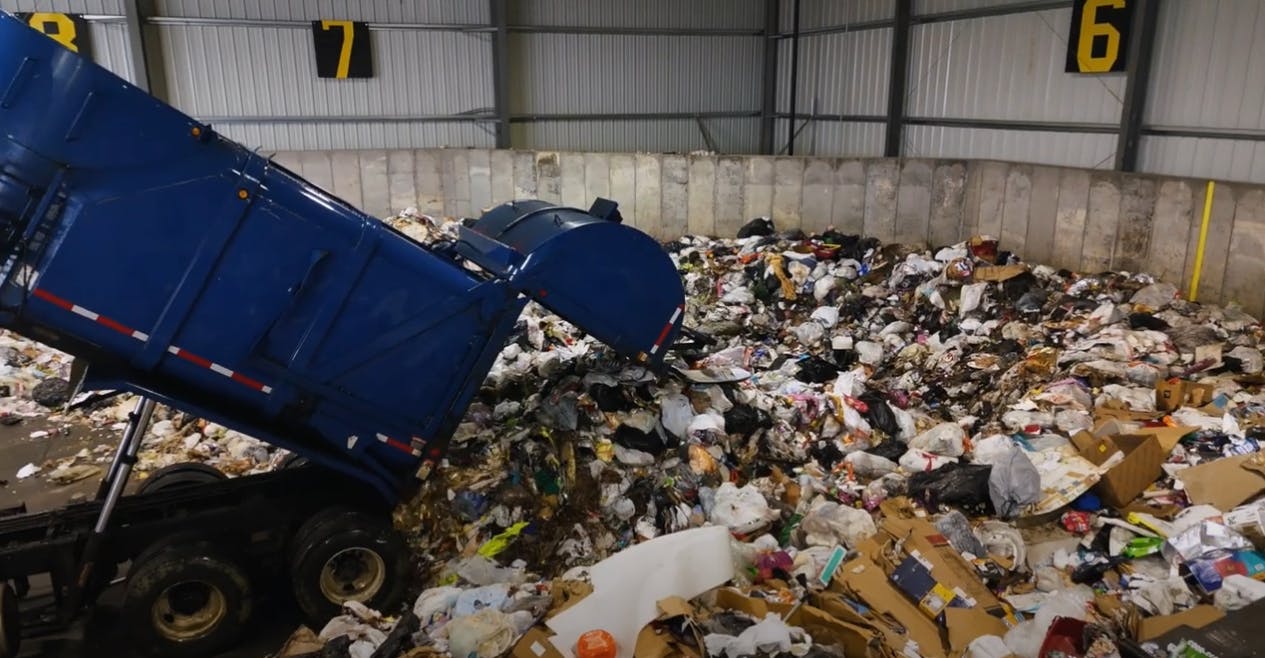Case Study: How AMP AI-Powered Sortation Transformed RDS Portsmouth’s MSW Recovery


Client Introduction: RDS Portsmouth, Virginia
RDS (Recycling & Disposal Solutions) operates a key material recovery facility in Portsmouth, Virginia, where it processes over 50,000 tons of material annually. Of that volume, roughly 35,000 tons are classified as municipal solid waste (MSW). This facility accepts a wide range of waste streams, including commercial and single-stream recycling.
RDS has long prioritized innovation in sustainable material recovery. That commitment led to the integration of AMP’s AI-powered sortation system within a newly constructed transfer and processing building.
Challenge: Traditional Sorting Methods No Longer Meet Efficiency Goals
Before partnering with AMP, RDS relied on conventional material recovery processes, including labor-intensive manual sorting and equipment that separated materials by particulate size. This approach required significant staffing, offered limited precision, and was constrained by mechanical inefficiencies.
As volumes increased and the demand for cleaner, more consistent material recovery grew, RDS recognized that traditional methods were no longer viable, especially for MSW. The team needed a solution that could reduce reliance on manual labor, increase throughput, and maintain high material purity despite the challenges of mixed waste streams.
Solution: AI-Powered Sortation with AMP
To meet these challenges head-on, RDS partnered with AMP to install a fully automated sorting system in a newly constructed 33,000-square-foot facility.
The AMP solution uses advanced AI to identify, sort, and recover valuable recyclable materials directly from municipal solid waste streams: materials that would otherwise be lost to landfill.
Unlike traditional screen-based sortation that separates items based on size, AMP’s system uses neural networks and vision-based AI to identify individual materials by type, regardless of shape or contamination. This capability allows the facility to recover plastics, paper, and other recyclables directly from MSW with precision and speed.
The design and installation of the AMP system were tailored to RDS’s operational needs and footprint. The result is a future-ready platform with fewer mechanical components, improved uptime, and greater adaptability.
Results: Improved Efficiency with Minimal Labor Input
Since going live, the AMP system has allowed RDS to operate with significantly less manual labor while achieving greater accuracy in material recovery. Jason Mattis, General Manager at RDS Portsmouth, emphasized the reduced dependence on staff as a core benefit of AMP’s AI-guided technology.
The precision of the system allows valuable commodities to be reclaimed more easily. These materials can then be sold back to local mills and industries, creating new revenue streams and reducing the amount of waste sent to landfills.
Results: Clean, Consistent Material Recovery from MSW
A key objective for RDS was the ability to sort MSW more effectively and recover recyclable materials that are typically lost. AMP’s AI technology enabled exactly that. The system identifies individual pieces of recyclable material (even from contaminated or mixed waste streams) and removes them for baling and resale.
RDS is achieving higher recovery rates and cleaner bales across a range of material types by pulling out usable materials directly from the waste stream and separating them with precision. These improvements position the facility to meet increasing demands for recycled feedstock while maintaining operational control and profitability.
Results: Long-Term Partnership and Continued Innovation
AMP represents a technology partner for RDS. From early system design through installation and ongoing support, AMP has maintained a strong relationship with the Portsmouth facility.
Mattis described AMP’s team as knowledgeable and professional, stating that the company stands behind its equipment and supports the installation with reliable service. The AMP system delivered on its performance expectations and gave the RDS team a new level of operational confidence in their recovery process.
Looking forward, RDS sees AMP’s technology as a key part of its ongoing strategy to modernize processing capabilities, reduce costs, and improve material recovery. The company plans to continue investing in efficient systems that meet the demands of commercial and municipal customers throughout the region.
Looking Ahead: A Scalable Model for Future Growth
RDS is committed to progressing with the industry and investing in high-efficiency infrastructure. The success of AMP’s system in Portsmouth is a model for how the company plans to grow and serve communities across Virginia and beyond.
AMP’s AI-powered sorting technology is helping operators like RDS turn mixed solid waste into valuable, reusable material. With a purpose-built facility, minimal labor input, and reliable material purity, the Portsmouth project shows what’s possible when advanced automation meets real-world recycling needs.
Discover How AMP Smart Sortation™ Can Transform Your Operations